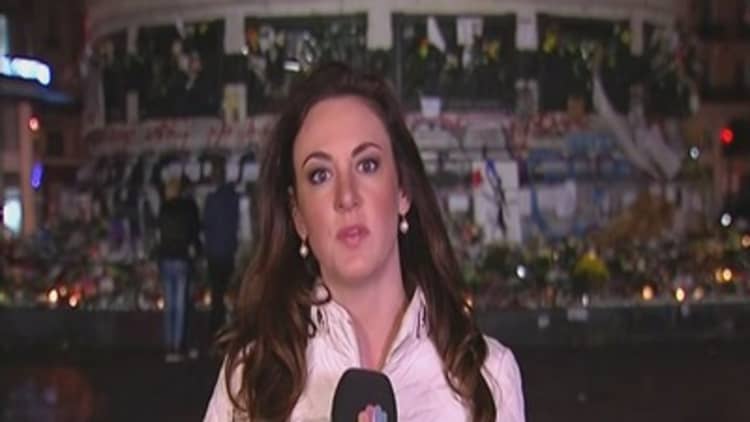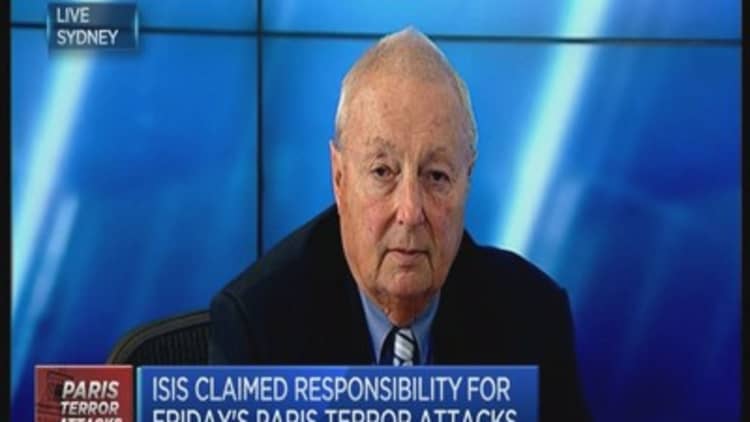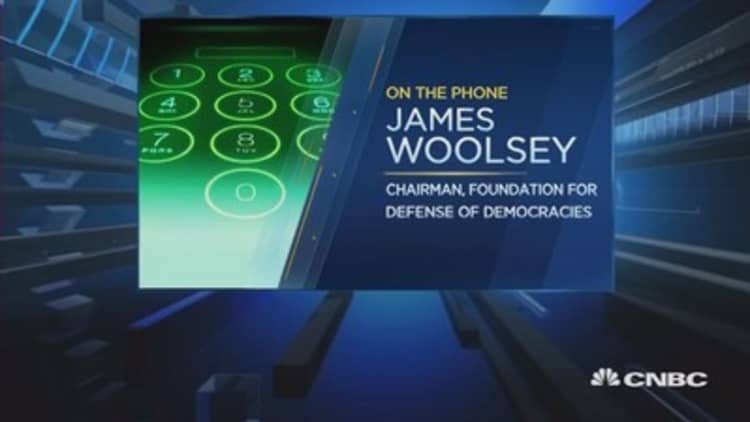Friday night’s deadly terrorist attacks in Paris are likelyto have reverberations way beyond thegrief-stricken city.
With the G-20 summit of leaders of the world’s most important economies running in Turkey until Monday night, the debate over how international leaders should respond is already moving forward fast.




CNBC takes a look at the major areas of focus in coming days and weeks:
Security at home and abroad
The level of military engagement in Syria has already, unsurprisingly, moved up the agenda, with France on Sunday launching airstrikes on Raqqa, headquarters of Islamic State. President Francois Hollande's description of the terror attacks in Paris as an "act of war" could also be significant, if it is the precursor to invoking NATO's Article 5 and essentially calling on other alliance members to back France in the battle with IS.
U.K. Prime Minister David Cameron told the BBC Monday of his wish to extend his country's military involvement.
In the light of the attacks, defence and security experts are upgrading the risks of a further attack on a major Western city. Tighter controls at well-known landmarks and government buildings, longer queues in airports and ramped-up border security are all likely.
This also indisputably marks an expansion of IS' agenda beyond its territories in the Middle East.
"Such a series of successful attacks on targets aligned with countries at war with IS in Syria suggests a new front in the conflict, with IS moving beyond fighting in Syria and Iraq to extending the theatre of war beyond its 'caliphate,'" Tina Fordham,chief global political analyst at Citi, wrote in a research note.
Migration crisis
Divisions within Europe over the crisis have already been thrown into sharper relief by the attacks, particularly after a Syrian passport linked to a man who traveled through Greece and Serbia recently was found at the Bataclan hall where most of the killings took place. A French official has since said that the passport cannot be verified.
The so-called Schengen agreement for a borderless Europe may also come under increased threat, particularly if France's porous borders with Belgium were crossed by one or more of the attackers, as currently seems likely. German Chancellor Angela Merkel has already come under fire at home for her open-door welcome to refugees and it now seems increasingly likely that this will be further altered.
Putin rapprochement
Vladimir Putin regime's increased military support in Syria has been viewed as a potential way back in from the cold for Russia, after its alleged actions in Ukraine led to sanctions from Western governments. While Russia is still backing another side — that of President Bashar Assad — to the West, if an "anyone but IS" policy develops, greater co-operation looks likely.
Syrian situation
Another result of the weekend's tragedy could be adding a sense of urgency to finding a resolution of the Syrian conflict, which has raged for close to five years with little sign of abatement.
"Diplomatic efforts to produce a political settlement to the Syria conflict will likely also see increased vigour," Fordham pointed out.
Political fallout
Across the Western world, politicians will find their domestic as well as international game has changed following the attacks. Hollande is likely to face an immediate increased challenge from the far-right National Front in upcoming regional elections; in Germany, the seemingly unassailable Merkel is facing one of her greatest ever challenges from the handling of the migration crisis; the U.S. presidential race is likely to be ever more focused on security, as the weekend's debate between Democratic candidates demonstrated.
CORRECTION: An earlier version misstated the status of Syrian President Bashar Assad.




